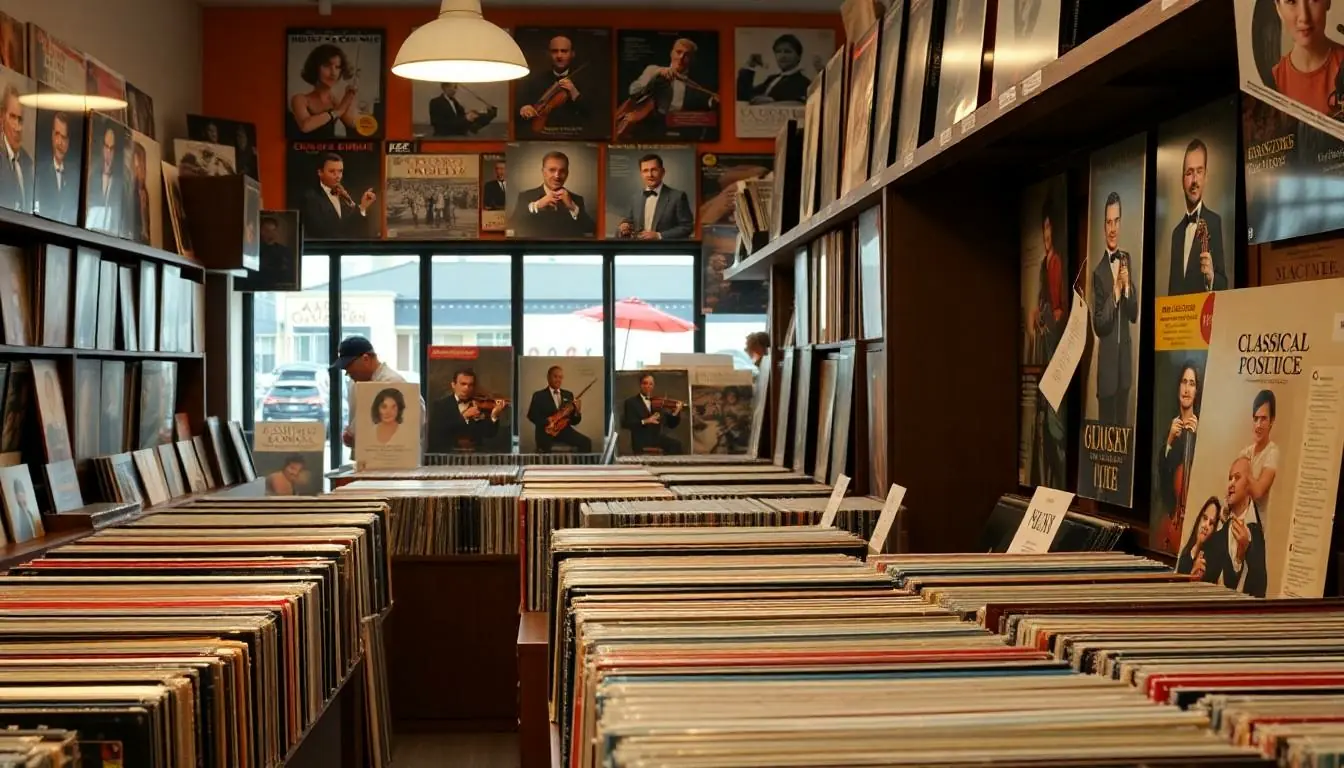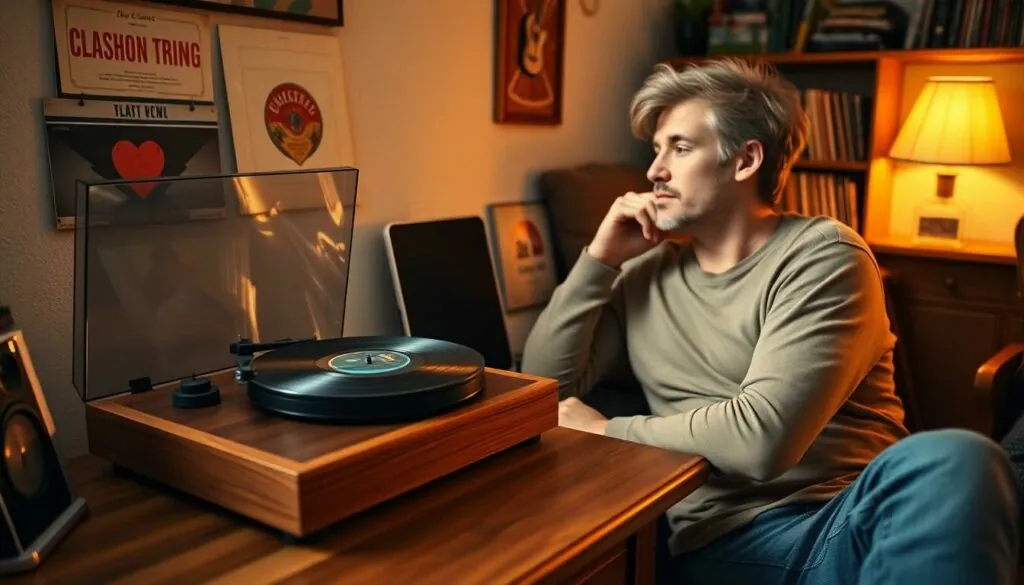Table of Contents
ToggleIn a world where digital tunes reign supreme, classical music vinyl emerges as the sophisticated rebel. There’s something undeniably charming about the crackle of a needle hitting the grooves, transporting listeners back to a time when music was an experience, not just background noise. Imagine sipping a glass of wine while Tchaikovsky’s symphonies swirl around the room, wrapping you in a warm embrace of nostalgia and elegance.
Classical music on vinyl isn’t just for the elite; it’s for anyone who appreciates the artistry behind each note. With its rich sound and tactile nature, vinyl offers an intimacy that streaming simply can’t match. So dust off that turntable and prepare to elevate your listening experience—it’s time to let the classics spin you into a blissful state of musical euphoria.
Overview of Classical Music Vinyl
Classical music vinyl offers a distinct listening experience characterized by warmth and depth. Collectors appreciate the tangible nature of vinyl records, which provides a unique connection to the music. A broad range of classical compositions, from symphonies to chamber music, surfaces in vinyl format, appealing to diverse musical tastes.
Vinyl records present sound nuances often lost in digital formats. Listeners may notice the complexity of orchestral arrangements more clearly on vinyl, enhancing the overall enjoyment. Production methods focused on analog techniques lead to a richer sonic palette, captivating audiophiles and casual listeners alike.
A variety of labels specialize in classical music on vinyl, ensuring broad availability. Renowned labels like Deutsche Grammophon and Philips consistently release high-quality recordings, showcasing celebrated artists and orchestras. Special editions and reissues further entice collectors, offering beautifully crafted packaging and exclusive content.
Connoisseurs often seek vintage vinyl for historical significance and audio quality. Classic pressings from the 1950s and 1960s hold immense value among collectors, frequently characterized by warmer sound profiles compared to modern counterparts. The thrill of discovery at record stores or online marketplaces contributes to the vinyl culture surrounding classical music.
Communities form around the appreciation of classical music on vinyl, fostering discussions and sharing recommendations. Online forums and social media platforms provide spaces for enthusiasts to connect. Exploring these connections deepens the overall enjoyment of classical music, establishing a shared passion that resonates through generations.
The Resurgence of Vinyl Records

Classical music on vinyl has seen a remarkable revival in recent years. This increase reflects a growing appreciation for analog audio experiences amidst a digital landscape.
Historical Context
Vinyl records first gained popularity in the early 20th century, offering superior sound quality compared to their predecessors. By the mid-1900s, classical music labels flourished as record companies began producing high-fidelity pressings. Collectors eagerly sought iconic releases featuring renowned orchestras and conductors. In an era dominated by cassette tapes and CDs, vinyl maintained a loyal following. Nostalgia played a crucial role in keeping the medium alive. Classic pressings from the 1950s and 1960s remain highly sought after for historical significance.
Modern Revival Trends
Current trends highlight a significant shift towards vinyl records, especially among younger generations. Music enthusiasts are drawn to the tangible nature of vinyl and the unique warmth it provides, enhancing classical compositions. Online platforms and social media foster communities around vinyl collecting, facilitating interactions and shared experiences. Additionally, record stores report increasing sales of classical vinyl, prompting new releases from established and indie labels alike. Celebrated labels such as Deutsche Grammophon continue to innovate, attracting a diverse audience. Vinyl’s resurgence in classical music reflects a broader cultural movement that values authenticity and rich listening experiences.
Benefits of Listening to Classical Music on Vinyl
Listening to classical music on vinyl offers unique advantages that enhance the overall experience. Audiophiles and casual listeners alike appreciate these benefits.
Sound Quality
Vinyl records provide warmth and richness that digital formats often lack. The analog nature of vinyl captures sound nuances, allowing intricate orchestral arrangements to come alive. Many listeners notice a fuller range of tones, from deep bass to shimmering highs. Unlike compressed digital files, vinyl retains depth and clarity, creating an immersive listening experience. Experts acknowledge that high-fidelity pressings from celebrated labels deliver exceptional audio quality, making classical pieces resonate in a profound way. Individuals invested in the subtleties of sound find vinyl’s qualities particularly appealing, elevating their appreciation of compositions.
Collectibility and Aesthetic Appeal
Collecting classical music on vinyl has become a passion for enthusiasts. Many seek out rare pressings that hold historical significance, enhancing their collections. The artwork and packaging of vinyl records add visual enjoyment, often elevating them to decorative items. Stacks of records create an inviting atmosphere that invites exploration. Engaging with vintage vinyl brings a sense of nostalgia, evoking memories tied to past eras. Communities around vinyl collecting encourage sharing discoveries and recommendations, enriching the overall experience. Not only is the tangible nature of vinyl appealing, but the joy of uncovering a sought-after record makes the process exciting.
Recommended Classical Music Vinyl Albums
Exploring classical music on vinyl can lead to remarkable auditory experiences. Collectors and newcomers alike appreciate a range of distinguished albums worth considering.
Essential Composers
Beethoven stands out for his symphonies and string quartets. Mozart’s works epitomize clarity and melody, making his vinyl recordings essential. Tchaikovsky captures emotional depth in his ballets and symphonies. Bach’s compositions reveal intricate counterpoint, ideal for high-quality pressings. Brahms offers lush harmonies, perfect for the analog format. Collecting albums of these composers enhances any vinyl library.
Noteworthy Record Labels
Deutsche Grammophon remains a leading label known for producing exquisite recordings. Philips features an impressive catalog with many notable classical artists. RCA Red Seal has delivered timeless performances, especially in the mid-20th century. Chandos impresses with its dedication to showcasing contemporary composers. Various indie labels have emerged, releasing unique and high-quality recordings. Each of these labels contributes to a rich selection of classical vinyl for enthusiasts.
Care and Maintenance of Vinyl Records
Caring for vinyl records ensures a lasting, pristine listening experience. Regularly handle records by the edges to avoid fingerprints and smudges. Cleaning vinyl before and after each play is essential. Use a carbon fiber brush to remove dust, along with a cleaning solution designed specifically for vinyl.
Proper storage plays a significant role in preserving records. Store vinyl vertically to prevent warping. Keep records in a cool, dry place away from direct sunlight to maintain their integrity. Consider using anti-static sleeves to protect records from dust and moisture.
Occasionally inspect records for scratches or dirt. Deep cleaning can revive worn records. Use a professional-grade record cleaning system for a thorough cleanse. For persistent dirt, ultrasonic cleaners provide an effective solution.
Play records on quality turntables equipped with appropriate cartridges. Ensure that the stylus is clean and well-maintained, as it can affect sound quality. Regularly check alignment to avoid unnecessary wear on records.
To address any playback issues, apply stylus cleaning solutions regularly. Look for signs of dust buildup on the stylus itself. Keeping equipment in optimal condition ensures the best auditory experience.
Regular maintenance not only enhances sound quality but also extends the lifespan of vinyl records. By following these care guidelines, classical music enthusiasts maintain their collections and enjoy rich, vibrant sound for years.
Classical music vinyl offers a unique listening experience that resonates with both nostalgia and sophistication. The resurgence of this medium reflects a broader appreciation for analog sound in a digital world. Collectors and enthusiasts find joy in the tangible nature of vinyl records, which create a deeper connection to the music.
With a wealth of classical compositions available on vinyl, listeners can explore diverse genres and discover rare pressings that enhance their collections. Engaging with these records not only enriches the listening experience but also fosters a vibrant community of like-minded individuals. As classical music on vinyl continues to thrive, it invites everyone to savor the warmth and depth that only vinyl can provide.





